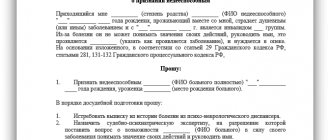Author of the article: Elena Petrenko Last modified: January 2020 10182
According to Federal Law No. 48-FZ dated April 24, 2008, guardianship of an incompetent person is established only by a capable person who has reached the age of majority. There are also other requirements for guardians, which anyone who plans to become the legal representative of an incapacitated person should be aware of.
Temporary guardianship
The concept of “temporary guardianship” does not exist in the Family Code of the Russian Federation. Such rights fall under Article 12 of the Federal Law of the Russian Federation No. 48 “On guardianship and trusteeship”. This document states:
- the procedure for temporary care of children by a guardian;
- degree of participation of trustee bodies;
- responsibility of each of the above individuals. and legal persons
When parents, for any reason, are deprived of the opportunity to take care of their children, they have the right to contact the PLO, proposing, for example, the candidacy of a grandmother as a guardian who will perform the duties of a parent during their absence (forced or voluntary).
It is impossible to predict life situations; sometimes circumstances turn out to be beyond your capabilities, and then additional help will be required. Guardianship or patronage support system is a solution for those citizens who are currently unable to take care of themselves and ensure the defense of their legal and legal interests.
About incapacity
An incapacitated person does not have the ability to make decisions and care for himself. This situation may occur due to old age or mental illness. In any case, people are recognized as incompetent by a court decision after an examination.
Important! In some cases, it may be that a person manages to return to normal life, for example, a mentally ill person has recovered from a mental illness. Then, again, by court decision it will be possible to restore legal capacity by proving your ability to make reasonable decisions.
The problem with an incapacitated citizen is that he is deprived of many rights that healthy people have. These restrictions are made so that a person does not harm himself. After all, he does not account for his actions, which is why he risks becoming a victim of scammers, losing property and even life.
If incapacity has been recognized, the unhealthy person is limited in the following:
- You cannot choose your place of residence.
- There is no opportunity to dispose of your property.
- You cannot take part in transactions, for example, purchase and sell, donate, exchange, or write a will.
- Unable to participate in elections.
- There is no opportunity to raise a child.
- It is prohibited to enter into a marriage union.
- Applications to government agencies are not permitted.
This is interesting: Does the clinic have a book of complaints for 2020
That is why a guardian is appointed so that he can make decisions for the sick person. It may also be necessary to provide care to a person if they can no longer meet their basic needs. In any case, the duties of a guardian must be fulfilled in full, because otherwise the rights of an elderly or mentally ill person will be violated.
Cohabitation
According to Article No. 36 of the Civil Code of the Russian Federation, an incompetent citizen over sixteen years of age can live separately from his guardian, however, only with the consent of the guardianship authorities. And children under the age of sixteen must share housing with their guardians.
Guardianship of an incapacitated citizen is a standard state procedure, which not only requires the newly appointed guardian to comply with certain rules and fulfill obligations, but also provides him with tangible benefits. Throughout the entire period of guardianship, the responsible government authorities monitor the life and property of the ward.
Who is “incompetent” for the court?
A person's capacity depends on age and ability to think clearly. In the first case we are talking about minor children. Until the age of 18 they are not considered legally competent. Parents (father or mother), older brothers and sisters, other relatives, or guardians appointed by the educational institution must be responsible for the child. Adults with mental disorders due to the inability to protect their rights, adequately perceive information and provide for themselves represent the second category. They are handed over to the guardianship authorities. If a citizen may pose a danger to himself or others, the judge will send him for compulsory treatment to a psychiatric clinic.
A verdict declaring a person incompetent means the loss of the rights to enter into any transactions, dispose of property, marry, change place of residence, vote, submit applications to government agencies and raise a child. From now on, the guardian will make decisions. He is obliged to coordinate his actions with the guardianship authorities. If a citizen has managed to restore his sanity, which can be established through a medical examination, then the court has the right to recognize him as legally competent.
Who is appointed
Often close relatives of the person take on the right of guardianship over the incapacitated person. Moreover, they do this free of charge, because they really want to take care of a family member. However, a legally appointed guardian must meet specific requirements. After all, it often depends on this whether he will provide proper care and fully perform his duties.
A guardian is appointed who meets the following conditions:
- Only capable citizens are selected.
- There is no criminal record related to causing harm to the health and life of people. For example, they were not tried for murder or incitement to suicide.
- Parental rights were not deprived.
- Age of majority.
It is also important that the guardianship of the incapacitated person is provided by someone who does not have an alcohol or drug addiction. Because if a person has these bad habits, then with a high probability he will not be able to fully care for the person. Moreover, if he lives with him, there is a risk that he may be harmed while intoxicated.
If a citizen has lost his guardianship status in the past, he will not be able to be appointed to this role again. The same applies to those people who canceled their adoption due to their own fault. It is also important to ensure that the person appointed does not have any illnesses that are prohibited for the purpose of guardianship. For example, a person with tuberculosis does not have the opportunity to become a caregiver.
In other cases, obtaining this status is possible, but you must first find out the rights and responsibilities of a guardian over an incapacitated person. Because before applying, a person must be sure that he can cope with this role.
Required documents for guardianship benefits
To apply for the benefit, you must submit the following documents:
- Original guardianship agreement.
- Passport of the person appointed as the legal representative.
- Birth certificate of a minor taken into custody.
- Documentary proof of the guardian's income. A certificate may not be required, but it is better to have it with you.
- Certificate from the place of work. If it is not available, you must submit a certificate from the labor exchange.
- Application for cash payment. It is compiled at the time of application.
This payment can be processed at the Department of Social Protection of the Population or the MFC. This can be done either by the guardian himself or by another person. But for this, he will need to have a notarized power of attorney in his hands, giving the right to act on behalf of the legal representative of the minor.
What does a guardian receive for performing their duties?
The appointed representative of an incapacitated citizen is obliged to fully and disinterestedly fulfill his obligations. In response to conscientious work, the state guarantees benefits and payments to the guardian. In addition, there are certain advantages to such powers:
- Living together in the apartment of a ward or guardian.
- Control of incoming funds. The guardian must report all expenses to the PCO.
- Carrying out actions and making decisions on behalf of the ward.
Representatives of incapacitated citizens should be aware that at the legal level the possibility of transactions with the property of the ward in favor of the guardian is blocked.
This circumstance negates the chances of inheriting the property of the ward. The exception is when an inheritance agreement is written before a court verdict on incapacity is issued. Compensation for wasted time is due to citizens caring for incapacitated people and not receiving any official income. Its size is 1200 rubles. Payment for work will begin from the moment the corresponding application is submitted to the pension fund.
What is guardianship of an incompetent person?
According to the Civil Code of the Russian Federation, guardianship can be carried out in two ways: full guardianship and patronage.
In the first case, the guardian has full control. In the interests of an incapacitated person, the guardian controls his funds, organizes his life, and controls the patient’s quality of life. In the case of partial guardianship - patronage, assistance is provided in the area in which a sick person or a citizen with disabilities is unable to exercise control. Such rules apply to the preparation and transfer of documents under the guarantee of a citizen, payment of utilities, purchase of goods, etc.
Benefits and remuneration for a guardian of a minor
In addition to the listed opportunities, a person is also entitled to labor benefits for guardians of minor children:
- Additional four days off per month.
Important
! If they were not used in the current month, then they do not carry over to the next year.
- Additional two-week leave for guardians of children at their own expense. It is provided no more than once a year.
- Refuse to work on weekends or holidays.
- Avoid work trips that involve spending the night away from home.
These benefits apply to all legal representatives of minor children. In addition to benefits, the rights of guardians of orphans and children deprived of parents also apply to cash payments. They will be assigned in one of the following cases:
- The trustee has not reached retirement age and is a legally competent citizen.
- In case of dismissal of the guardian of a minor child or loss of earnings.
- When caring for a minor child recognized as disabled.
If one or more of the listed conditions are met, then the citizen has the right to apply for state benefits. In 2020 you can count on the following payments:
- 15,000 rubles for a minor child under 12 years of age. The pension for a guardian of a minor for wards aged 12 years or more is approximately 20,000 rubles. Please note that this benefit is paid every month.
- Assistance from the state at the time of transfer of the child to the guardian in the amount of 14,500 rubles. This payment is made once.
- Additional payments that are calculated and assigned by regional authorities.
The RF IC also provides for remuneration directly to the guardian (foster family). In this case, an agreement is concluded between the authorized social protection bodies and the guardians. According to such an agreement, the adoptive parents must take care of the child, give them education and upbringing, and for this the state determines a certain amount, a kind of salary to the child’s guardian for his work. The amount of such benefits is regulated by regional authorities.
Register now and get a free consultation from Specialists
Right to living space
Availability of housing is an important issue not only for minors, but for any person.
The ward has the right to receive real estate:
- under a gift agreement;
- under a purchase and sale agreement;
- by inheritance;
- as a result of privatization.
The transfer of a minor to guardianship (trusteeship) does not deprive him of the right of ownership of the property he owns.
Until reaching the age of majority or acquiring full legal capacity, the ward cannot independently dispose of his property. However, the right of use of a minor is not limited and is regulated by the norms of the Civil Code of the Russian Federation.
The state provides the right to obtain residential premises out of turn, which is regulated by the norms of the Housing Code of the Russian Federation.
Right to income
A minor ward has the right to receive income that serves as a material basis for ensuring proper living conditions and maintenance.
More information about children without parental care can be found here.
Articles 26 and 28 of the Civil Code of the Russian Federation regulate the procedure for disposing of such funds.
It is important to remember that the state provides wards with various benefits, including the right to free travel on public transport, with the exception of taxis.
Appointment of a guardian
The basis for appointing a guardian for an incompetent person is carried out exclusively after a court decision has been made to recognize the citizen as such. When registering guardianship over a citizen, the guardian is established by law in order to protect the rights and defend the interests of the latter.
A person who has been declared incompetent by a court due to illness or mental illness according to the law cannot continue to remain unaccompanied by the guardianship authorities. It is illegal. The term for appointing guardians is no more than a month.
Who appoints
To register guardianship over a citizen with limited physical or mental abilities, the candidate for guardianship should contact the local regional guardianship and trusteeship authorities. This can be done in several ways:
- The candidate personally submits a statement of intent to obtain guardianship over an incapacitated person.
- Through the selected representative of the candidate for guardianship, documents are submitted to the guardianship and trusteeship authorities.
It is noteworthy that the procedure for registering guardianship is the same for all regions, but certain situations and nuances can, one way or another, affect the duration of the process and its result. Thus, some guardians prefer to contact special organizations, which are entrusted with the preparation of all necessary documents. This service is not provided by the state as free, and therefore the future guardian himself pays for it.
In the form of arrangement of relationships in the legal field “guardian-ward,” the latter may be:
- Children who have not reached the age of majority with disabilities.
- Incapacitated citizens with limited physical or mental capabilities.
Where are guardian benefits issued?
Registration of documents after a citizen is declared incompetent takes place in the guardianship and trusteeship authorities of the regional district. The organization's addresses and work schedule can be found on the official website of your city.
Documents for registration of guardianship
After a citizen of the Russian Federation is declared incompetent in court, the guardian takes a number of actions aimed at formalizing the guardianship provided for by law. List:
- Application of the candidate to the guardianship and trusteeship authorities.
- Certificate from the last place of work (duration of work at the last place was at least 3 full calendar months).
- Court decision recognizing incapacity.
- Certificate from a medical institution about the health status of the candidate for guardianship.
- Consent in writing of all adult members of the guardian's family to the possible cohabitation of an incapacitated citizen with the guardian. However, the law does not provide a clear definition of the cohabitation of the guardian and the ward. Free accommodation of an incapacitated citizen in his own home is also possible, but subject to permission from the authorized regional body (for example, if the guardian is not able to live in the ward’s locality).
- Document on special training of the guardian.
- Autobiography.
- Certificate of marital status, number of people registered in the house.
- Documents confirming the place of residence, its compliance with sanitary and technical standards.
In some cases, the relevant authorities may require a list of documents, in their opinion, confirming the ability of the guardian to ensure the legal rights of the ward.
Who can be a guardian
The law clearly explains who can claim the right to be a guardian:
- A citizen of the Russian Federation who has expressed a desire to be a guardian.
- A guardian cannot be appointed for an incapacitated person against his or her will.
- The candidate must be over 18 years old, that is, an adult.
- The intended guardian and the ward have no conflicts, and the incapacitated person himself is not against patronage. If mental retardation is recognized by the court, and the ward is unable to determine priorities, a citizen who has proven his desire to fulfill his obligations to the ward according to the law is appointed as a guardian.
Termination of guardianship
The grounds for termination of guardianship are also determined depending on the form of guardianship:
- In the case of the patronage system, the grounds for terminating guardianship can be both the personal desire of the person under guardianship and the testimony of witnesses who speak of a discrepancy between the scope of duties performed by the guardian in relation to the ward.
- In the case of full guardianship, the grounds for termination of guardianship are:
- violation of the rights and obligations of the ward;
- testimony of witnesses about immoral behavior, regular drunkenness of the guardian;
- medical report about the health problems of the guardian;
- misappropriation of funds of the ward;
- moral oppression of an incapacitated person by a guardian.
A complaint from witnesses who see a violation of the rights of an incompetent person is sent to the relevant territorial body, in this case, the guardianship and trusteeship office, located at the place of residence of the guardian and legal trustee. The emergency commission draws up an act, which consists of 3 copies: 1 - for the applicant, 2nd - for the guardian, 3rd - for the guardianship authorities.
The right to education, provision of conditions of upbringing and maintenance
The legislation of the Russian Federation in the field of education obliges every minor to receive a general education. In order to implement this obligation, the guardian (trustee) is obliged to act in accordance with the provisions set out in the RF IC.
The right to education, provision of educational conditions and maintenance allows a minor to develop, as well as choose the form of education . Moreover, the child is given the right to exercise the right to choose educational institutions and further realize his potential in the chosen profession.
The Law “On Education” regulates the protection of the legal rights and interests of the child in the process of obtaining an education.
You can learn about adopting a child in the Russian Federation in this article.
The legislator was especially concerned about respect for the human dignity of orphans, taking into account their special status, which allows the person under guardianship to feel like a full-fledged child and does not allow the development of various kinds of complexes.
Requirements for a guardian
Meeting the following requirements does not provide a 100% guarantee that the individual will be appointed as the legal representative. He must comply with all the standards established by the Civil and Family Code, namely:
- Location. There must be conditions suitable for living and meeting all sanitary requirements, suitable for the number of square meters for each family member.
- Financial well-being. The guardian's salary should be enough for the whole family. The calculation is made based on the cost of living established in a particular region.
- No criminal record. This fact in the biography will not make it possible to obtain guardianship over a minor child.
- Moral character and lifestyle.
- Social status and position in society.
- Upon reaching the age of ten, children are asked to consent to the appointment of this candidate as their guardian. Therefore, if there is a trusting relationship or family ties, it will be a definite plus.
Register now and get a free consultation from Specialists
How to arrange guardianship or trusteeship on a reimbursable basis?
Guardianship and trusteeship are usually provided free of charge. If payment is made from income from the property of the ward, then it is compensated. However, it must be taken into account that the maximum amount of remuneration paid to the guardian cannot exceed 5% of the income of the property for the reporting period.
If you want to receive remuneration for the services of a guardian, you need to enter into an appropriate agreement with the guardianship and trusteeship authority at the place of residence of the ward.
If the place of residence of the ward changes, the contract is terminated and a new one is concluded, but with the guardianship and trusteeship authority at the new place of residence.











